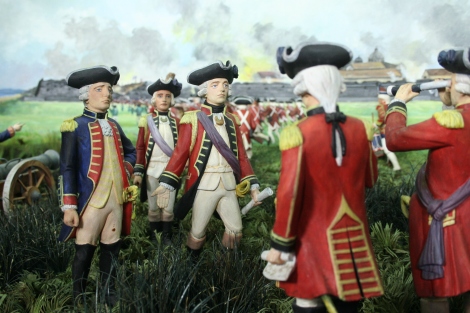Originally mused upon and written in 2012, and never published until now, still retaining its original glory (?)
250 years is a pretty important milestone, isn’t it? A quarter of a millenium. The big 2-5-0. Well, apparently 6th October 2012 sees the 250th anniversary of the British capture of Manila during the Seven Years’ War, which raged globally between the major European countries from 1756 to 1763.
It was such a momentous event for the outcome of the war that neither the British nor Spanish authorities back in Europe were aware that it had even happened by the time they signed peace terms five months later in 1763. In any case, the 10,000 or so British soldiers, marines and sailors were never really able – or willing – to project their power and authority beyond the confines of Manila and Cavite, suffering terribly from political infighting and a general lack of strategic vision. The rest of the colony remained in the hands of the Spanish colonial government, who steadfastly refused to surrender to the invaders.
After about one and a half years of occupation, the British upped and left, taking with them a fair bit of loot and leaving behind some deserting Indian soldiers. The Spanish resumed control of Manila, and everything went back to normal.
So why remember this now? It is often cited as the beginning of British ‘relations’ with the Philippines. Whilst it may be somewhat unsavoury to commemorate a hostile occupation that saw systematic plundering and several hundred people dead, it is argued that since it was the only offensive action by the British against the Philippines, we can now reflect upon close to 250 years since of friendship and cooperation, or at the very least peaceful co-existence, between our two peoples.
Thinking on this, I do sometimes wonder: how would things have been different if the British had actually succeeded in conquering and colonising the Philippines?
I can think of a few things that could have seen some change:
- English would have become the language of administration centuries earlier than it actually did
- The Spanish decreed in 1849 that every Filipino who did not have a standard surname should be given a Spanish-approved one (applied with varying success). Could many Filipinos have adopted English names like Smith or Johnson instead?
- The Catholic Church may not have been so powerful under the non-Catholic British, possibly preventing the full development of the ‘friarocracy’ that José Rival, one of the main the intellectual inspirations behind the Filipino revolution of 1896, detested
- Earlier introduction of Protestant missionaries and an Anglican hierarchy to the country, further reducing the power and influence of the Catholic Church in Filipino society
- Trade being directed away from Mexico and Spain and directed towards India and Britain, having a cultural, social, culinary and ethnic impact. Roast bistek tagalog curry with Yorkshire pudding, anyone?
- A British Empire with resources may have been a more effective governor of the Philippines than a near-bankrupt Spanish one; would there have been more development, a more efficient civil service, greater rule of law, a less feudal society? Or would a more powerful administration have been more tyrannical and plundering? How would this have affected the rise of the nationalist and revolutionary movement in the 1800s?
- Cricket, and potentially football, could have taken root in the Philippines, instead of basketball
- The USA would never have attacked a Philippines under British rule during the Spanish-American War of 1898. Can you imagine an un-Americanised Philippines?
The key question remains – would this have created a better, or a worse, Philippines? Would we be talking about a country that turned out like Malaysia or Singapore, or would Bangladesh be a better comparison? Maybe we shouldn’t focus on the what-ifs of an event 250 years ago that could have been world-changing but wasn’t. What’s done is done, the Philippines are where they are today because of the history that has actually happened.
The Filipino community living in the UK still looks back to the Philippines as a source of pride and comfort, and yet is equally committed to making the best of life here. Perhaps we can think of ways of practically celebrating the friendship and cooperation that has existed between the UK and the Philippines over most of the past 250 years.
As previously mentioned, sport is one way in which we here in the UK can contribute to a burgeoning social life in the Philippines. Sports stars such as English-Filipino Neil Etheridge are leading the way, using their footballing prowess to not only serve the motherland on an international level but also to grow the game from the grassroots, but we can all still contribute in our own small ways, perhaps by supporting Philippine FC.
And since food is the other great passion of Filipinos, we should not be shy of being cultural ambassadors for our cuisine here in the UK, whilst maybe introducing our relatives to the glories that are pies, scotch eggs, English sausages or Sunday roasts. And who knows, maybe there are some quirky culinary combinations out there just waiting to be discovered and presented to the world – just ask Robert Harland, an Englishman living in Bacolod, who won silver medal in the international category at the 2012 UK Marmalade Awards with a calamansi-brandy concoction, or (and here’s a rather cheeky 2014 insertion) look to the haggis sisig made by The Adobros…!
Just think what we could achieve if we were to collectively take the best of what we can learn from both worlds and apply them towards the betterment and enrichment of both countries. That’s true camaraderie.



250 years is not a quarter of a century, cousin! 😉 [MC – arrgh! You’re right! CORRECTED :-D] but nice article! Well done! Keep it up!!!